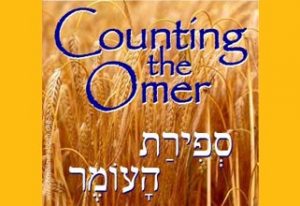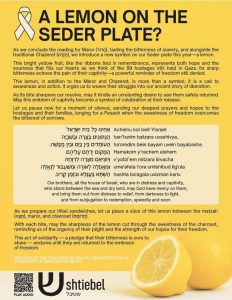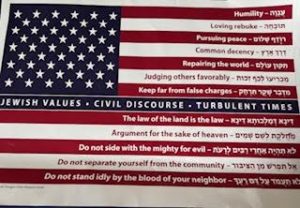Happy Memorial Day seems to be the most common greeting. But happy doesn’t feel like quite the right word. Maybe we are happy in the northern climes that it might feel a little like summer. Maybe we are happy that the kids are out of school or almost, at least here in Chicagoland and time takes on a different pace.
This day, Memorial Day is set aside to remember those who gave the ultimate sacrifice. Those who died in service to their country, to preserve “The American Way.”
For years, I marched in Memorial Day parades as a Girl Scout. In Evanston, where one year it even snowed, and we wore ski jackets over our uniforms. In Grand Rapids. In Chelmsford. Our troop in Chelmsford had t-shirts from Kohl’s, “Keep America Beautiful. Plant a tree, Be kind to nature. Conserve Energy. Volunteer.” It has sparkly daisies superimposed over the American flag. This shirt, which I still have and wore this weekend, fits my Girl Scout values, my American values, and yes, my Jewish values. I don’t think it is possible for me to separate them.
The soldiers who have died protecting our rights came from all sorts of traditions. Black, Hispanic, Native American, from many different countries. The list, of course, includes Jews. There was a powerful piece on CNN done by Dana Bash about correcting a mistake 80 years ago when Jewish soldiers in Italy were buried under crosses. https://www.cnn.com/2025/05/24/world/video/wwii-soldiers-star-of-david-digvid
Yet at Arlington National Cemetery, there was an attempt earlier this year to clean up history. Jews, Blacks, Women were being removed from the history. https://www.arlingtoncemetery.mil/#/
They won’t tell you that. But I just double checked. CKI had a member, Captain Irene N. Wirtschafter, who served our country, one of the first women to serve on board a ship during combat during World War II. She is buried at Arlington National Cemetery. Her obituary is here, crossed published in the Chicago Tribune, the Washington Post and Cocoa Beach where she was living at the time of her death. https://www.chicagotribune.com/obituaries/irene-wirtschafter-chicago-il/
She was a true woman of valor and deserves to be remembered this Memorial Day.
A member of our community who grew up with Captain Wirtschafter has visited the grave at Arlington and you can find it listed here: https://www.findagrave.com/memorial/search?firstname=Irene&middlename=&lastname=Wirtschafter&birthyear=&birthyearfilter=&deathyear=&deathyearfilter=&location=United+States+of+America&locationId=country_4&bio=&linkedToName=&plot=&memorialid=&mcid=&datefilter=&orderby=r
But you can no longer find it on the Arlington site. It comes up empty, no results. There is a plaque for her at CKI, and we read her name this Shabbat. She deserves to be remembered this Memorial Day.
This year Memorial Day seems especially fraught. I did follow the advice of my t-shirt. I planted. I gardened. I spent time in nature. I made sure our flags were flying. I wore the t-shirt.
Sometimes it is hard to talk about politics—or better said partisanship. In 2018, the Chicago Jewish Board of Education published a list, “Jewish Values, Civil Discourse, Turbulent Times. I come back to it again and again:
- Humility
- Loving rebuke
- Common decency
- Repairing the world
- Judging others fairly
- Keep far from false charges
- The law of the land is the law
- Argument for the sake of heaven
- Do not side with the mighty for evil
- Do not separate yourself from the community
- Do not stand idly by the blood of your neighbor
Those are all core concepts, core values, key commandments in Judaism. I stand by them.
This past week I did an invocation for the Elgin Township Board. It was their swearing in ceremony. I read the Prayer for our Country in Siddur Sim Shalom. Words that were originally written in the 1950s in more formal language and rewritten in 1985, We have been praying for our leaders since Jeremiah’s day. This week I had a member read it as we always do on Shabbat morning. She was very emotional. I reminded people that it has always been aspirational.
I’ve said this before. George Washington wrote a letter to the Jewish community of Newport, RI. His letter is aspirational, too. He said, “For happily the Government of the United States, which gives to bigotry no sanction, to persecution no assistance…: “To bigotry no sanction, to persecution no assistance” are the words on the entrance to the US Holocaust Museum in Washington DC. This week we watched in horror as a young couple was attacked and murdered outside another Jewish museum in Washington. There are no words. And no thoughts and prayers for me to express the gravity of this slaying.
Yet Washington closed his letter with a quote from the prophet Micah: “while every one shall sit in safety under his own vine and figtree, and there shall be none to make him afraid.” It was aspirational when Micah said it. It was aspirational when Washington wrote it. It remains aspirational today. That is the America that I want to live in. That is the America I heard as I was gardening on my deck listening to the birds. Keep America Beautiful is where we started this.
This was also Yom Yerushalylim, the day that Jerushalem was reunified during the Six Day War. Who can forget the images of Israeli soldiers weeping when they reached the Wsetern Wall. Part of my day included rereading My Promised Land by Ari Shavit. And that gardening? I am putting in an Israeli salad garden: tomatoes, cucumbers and peppers.
May this be a meaningful Memorial Day, filled with promise and hope and a commitment to our soldiers who have died that we might enjoy a parade, a picnic or a barbecue. And may we embrace a time when we can engage in civil discourse in order to work for that promise, where we do not live in fear. Remember, it’s aspirational. And we have to work for it.




